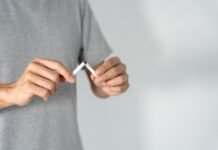If you drink alcohol, then you’ve surely heard the many myths about how to feel better in the morning after drinking. However, these are simply misconceptions. There is no science to back these old wives’ tales, and oftentimes they have the reverse effect, leaving you feeling worse.
It’s important to approach these myths with a critical mind and rely on proven methods for recovery. Understanding the actual impact of alcohol on your body can help you make informed decisions and take better care of yourself. To help you understand the real science behind how alcohol affects your body, we’re debunking five myths about how to curb rough feelings the morning after drinking.
Consuming Alcohol the Next Day Will Help — AKA, “Hair of the Dog”
If you wake up the morning after drinks with friends feeling a bit sluggish, consuming more alcohol won’t solve the problem. The reason you feel unwell in the first place is that your body is still working to break down the alcohol that’s already in your system. Adding more alcohol to the equation won’t do any good, as your body still needs time to break down what you consumed the night before. Give your body time to catch up.
When you consume alcohol, your liver metabolizes it into acetaldehyde, a toxic substance that causes many of the unpleasant symptoms of a hangover. Drinking more alcohol may temporarily dull your discomfort but ultimately delay your recovery. Instead of reaching for another drink, focus on hydrating with water or electrolyte-rich beverages to replenish lost fluids and electrolytes. Eating a nutritious meal rich in vitamins and minerals can also aid your recovery by providing essential nutrients your body needs. Additionally, getting plenty of rest allows your body to repair and recover more effectively.
Moderate Drinking Ensures You’ll Feel Fine the Next Day
While pacing yourself is always a good idea, whether you have one drink or five, you can still wake up feeling cruddy the next day. Some people are more sensitive to the effects of alcohol and will still experience “rough feelings” the following day, even if they only had a drink or two.
However, the quantity of alcohol you’re ingesting and the duration you’re ingesting it can affect how you feel the following day. Pacing yourself and drinking more slowly can help your body keep up. For example, you’ll likely ingest liquor (shots, specifically) a lot faster than beer or wine. So, if you opt to start taking shots halfway into the night, you’re putting additional strain on your body when it’s already trying to process the alcohol you’ve previously ingested. However, if you stick to beer or wine, you’re ingesting the same amount of liquor at a much slower rate, giving your body more time to catch up.
While this isn’t an exact science, drinking responsibly is your best bet. While there’s no guarantee you’ll wake up feeling 100% the next day, pacing yourself is a much smarter way to drink.
Caffeine is the Ultimate Cure-All Solution
Some believe a cup of coffee will help them “sober up.” This is, unfortunately, not the case. Take it from us: caffeine won’t cut it. You may feel more awake after drinking coffee, but your body will still process alcohol at the same pace. Your intoxication level also will not be affected by caffeine consumption. So, you’ll still have to face the same impairments whether or not you consume caffeine, including slow reaction times, blurred vision, and poor coordination. While you certainly can drink caffeine the following morning, don’t expect it to sober you up.
Additionally, relying on caffeine to mask the effects of alcohol can give a false sense of alertness, which might lead to risky behaviors such as driving. It’s essential to understand that only time can effectively reduce blood alcohol concentration and restore your body to its normal state.
Greasy Foods Will Soak Up the Alcohol
Everyone’s heard the myth that eating greasy food after drinking will absorb or “sop up” the alcohol in your system. While a cheeseburger and fries might taste great after a night out, eating – especially eating greasy food – after you drink won’t affect how quickly you sober up. Why? If you’re drunk, the alcohol is already in your bloodstream. Any food you eat after drinking will go to your stomach, where it won’t have an effect on the alcohol that made you drunk.
The bottom line: Eating when you’re already drunk will not affect how your body processes alcohol. If you are going to eat after drinking, however, choose healthier options that are high in protein, healthy fats, and carbs. While food won’t sober you up, you’ll at least feel better about eating something healthy as opposed to something greasy.
Sweat Out the Alcohol
Exercising or visiting a sauna while intoxicated is not only unhelpful, but it can also be dangerous. There is no scientific data to prove these methods are efficient in helping you sober up. In fact, they may make you feel worse. While light exercise the morning after drinking is okay (so long as you are completely sober), heavy, intense exercise is not recommended.
“Sweating it out” isn’t a viable strategy, as you’re not actually removing any alcohol from your body this way. Likewise, using a sauna after drinking also does not affect how your body breaks down alcohol, and it can actually cause you to feel sick(er). Saunas can also cause you to overheat or dehydrate.
The bottom line: If you’re feeling a little under the weather after a night of drinking, trying to sweat it out will only do more harm than good.
Rely on Real Science — Don’t Fall for Myths
There are so many myths and misconceptions circulating about how to recover from drinking and how to prepare for drinking. The truth is that if you do feel unwell, it’s best to get rest, drink water, eat well, and don’t push yourself too hard. By understanding these misconceptions and what to avoid, you are setting yourself up for success the next day.


























